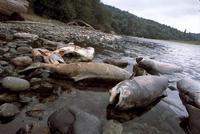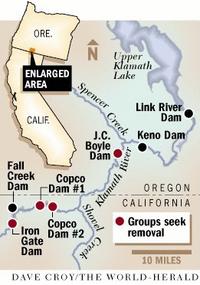Group wants Buffett to remove dams
,
| KBC NOTE: The article shows dead fish to promote dam removal. In 2002, the tribes demanded a surge of hot water down the Klamath River against advice of scientists who said this would be lethal to the salmon. Trinity River fish died when they reached the lethal water, and the enviros and Indians blamed farmers for "low flows". These same pictures are being used to promote Klamath Dam removal, blaming dams for dead fish, and assuming that dam removal will fix water quality with millions of tons of sediment being released into the river. |
Two years ago Leaf Hillman was a finalist for an American Indian leadership award from Howard and Peter Buffett for his role in a campaign to remove four dams from the Klamath River along the California-Oregon border.
Fehrman said he will be at the
Berkshire meeting, too.
"They're certainly within their
First Amendment rights to come,"
he said. "It has absolutely no
impact on anything that we would
do or not do, and really has no
impact at all on our
negotiations."
Starting today, dam removal
advocates plan to hold press
events in San Francisco,
Sacramento and Salt Lake City on
the way to Omaha.
Once here, they plan to
demonstrate to explain their cause
to Berkshire shareholders and hold
a ceremonial "brush dance" aimed
at healing a river that they say
is damaged by the dams.
Hillman may even raise a question
at the shareholders' May 5 meeting
at the Qwest Center Omaha. The
group says the efforts will be
nonconfrontational.
"From what we can tell, Warren
Buffett seems like a good guy,"
said S. Craig Tucker, campaign
coordinator for the Karuk Tribe of
California. "He seems like a smart
businessman. I think we have a
very strong case. We're not
looking for charity. We're looking
for a business deal that works for
him and doesn't destroy our
river."
The four tribes in the Klamath
basin - Karuk, Hoopa and Yurok
from northern California and the
Klamath from southern Oregon -
held similar demonstrations in
2004 and 2005 at shareholder
meetings of PacifiCorp's former
owner, Scottish Power.
Hillman and Tucker say the
demonstrations were a factor in
Scottish Power's decision to sell
the company to Berkshire. But
officials for PacifiCorp and
Scottish Power say there was no
connection.
Tucker said the group hopes that
Buffett and the shareholders will
influence PacifiCorp to remove the
dams.
"We can't say this is all Warren
Buffett's responsibility because
he just bought the company,"
Tucker said. "But what we do want
Warren Buffett and the other
investors to understand is that
their business is behaving in a
very socially irresponsible
manner."
The timing is important because
for the first time in decades
PacifiCorp is applying to renew
its federal and state licenses for
the dams and power plants.
The oldest of the dams was built
in 1917 and the latest in 1962.
Tucker and Kelly Catlett of the
Friends of the River in Sacramento
say today's wildlife and
anti-pollution laws, plus tribal
rights agreements with the federal
government, should prevent the
dams from getting new licenses.
The dams shut off migration of
salmon, steelhead trout and
lamprey eels to the upper reaches
of the Klamath basin and have
reduced migration below the lowest
dam. Last year federal authorities
prohibited commercial salmon
fishing along a 700-mile stretch
of the West Coast because of the
low migration numbers.
Hillman said the salmon are
inseparable from the region's
tribal culture: "Our ceremonies
are dictated and timed around the
migration of the salmon."
Much of the argument is about
money.
If PacifiCorp invests $300 million
in fish ladders, screens and other
improvements, it would be entitled
to recoup the money through
electricity rates paid by its
customers. No one knows who would
pay to have the dams removed, or
how much, if anything, PacifiCorp
would be paid for giving up the
dams.
Dave Kvamme, a PacifiCorp
spokesman, said the company is
willing to compromise if its
consumers can be assured of
reliable sources of electricity
and if PacifiCorp is compensated
for losing the dams.
Catlett, from Sacramento-based
Friends of the River, argues that
the dams can't qualify for new
licenses under current federal and
state laws and thus will become a
liability, not an asset worthy of
compensation.
The California Energy Commission
said in December that removing the
dams would cost less than building
the fish ladders.
Kvamme disagreed, saying nobody
knows the true cost of removing
the dams. He said it may cost
between $1.5 billion and $4.5
billion just to remove and treat
the millions of tons of sediment
behind the dams.
In addition, he said, state
governments on the West Coast are
requiring power companies to use
more renewable energy sources, and
hydroelectric power is the most
reliable renewable energy
available.
Kvamme said the dams generate
enough electricity for 70,000
homes.
Fehrman, a former Nebraska Public
Power District executive who
became PacifiCorp president with
Berkshire's purchase last year,
said protecting the environment is
a core value of PacifiCorp.
"We'll continue to work with the
groups for as long as it's
fruitful and there's a chance of
an outcome that can meet the needs
of the parties," he said.
Hillman, the tribal official, said
the groups will continue working
with PacifiCorp to see the dams
removed.
"We will see them in Omaha," he
said. "If they want to stand with
us to make the (dam removal)
announcement, we would love that.
But if they want to fight, we'll
continue to fight."


